Key takeaways:
- Homelessness is influenced by various societal factors, and shelters not only provide refuge but also foster community and connection among residents.
- Charities play a vital role by offering not just immediate assistance but also dignity, job training, and pathways to recovery, inspiring individuals to rebuild their lives.
- Living in shelters teaches gratitude, compassion, and adaptability, highlighting the importance of perspective in overcoming adversity.
- Supporting homelessness initiatives through volunteering, donations, and community awareness can make a significant impact and enrich both the giver and the receiver.

Understanding homelessness and shelters
Homelessness is a complex issue that often transcends individual circumstances, impacted by factors like mental health, addiction, and economic conditions. I recall a moment when I overheard someone in a shelter express their fear of judgment from society. It made me wonder: how often do we truly consider the stories behind the faces we see on the streets?
Shelters serve as a vital refuge for those experiencing homelessness, yet they are often more than just a roof overhead. I remember the sense of community I felt when sharing meals and stories with others. It struck me how these shared experiences fostered connections, reminding us that, at our core, we all crave companionship and understanding.
Living in shelters can be a mix of hope and despair. One night, I sat with a fellow resident who spoke of dreams lost but also of aspirations for a better future. It challenged me to think: what role can we, as a society, play in not only providing shelter but also in nurturing the dreams of those who find themselves without a home?
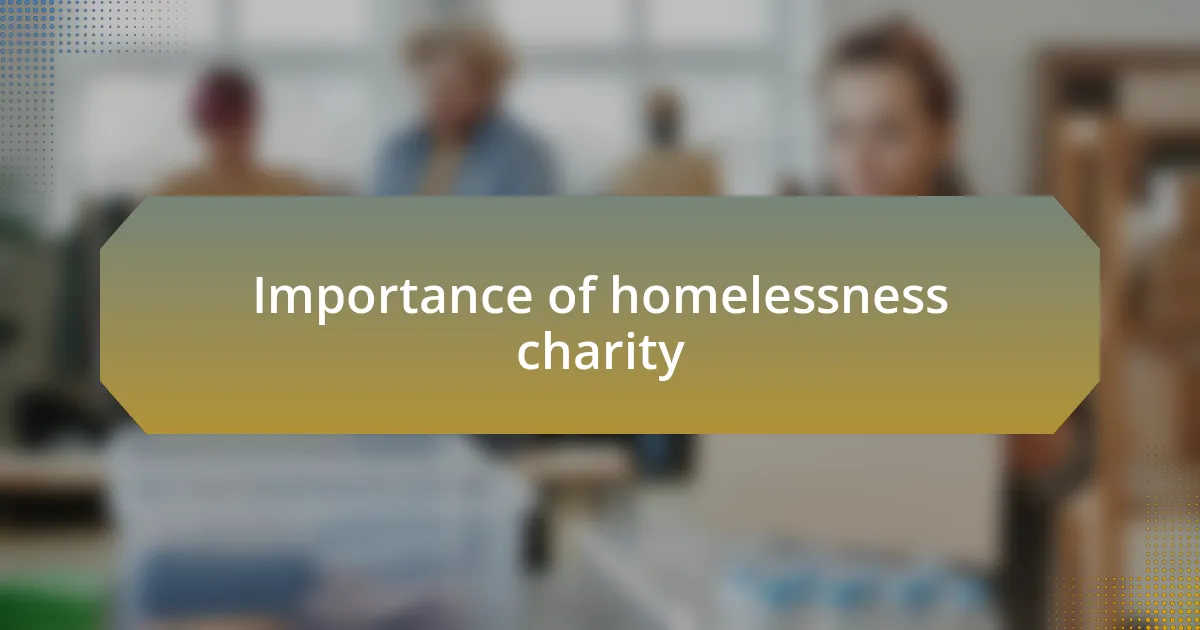
Importance of homelessness charity
The role of homelessness charities extends far beyond immediate assistance; they provide hope and a pathway to recovery. I remember talking with a volunteer who shared how, in addition to offering meals and shelter, the charity facilitated job training programs. Hearing success stories of individuals who transformed their lives made me realize just how crucial such support networks are in breaking the cycle of homelessness.
Charities not only provide physical sustenance but also foster a sense of dignity and respect for those in need. I once watched as a charity organized a clothing drive, allowing individuals to choose outfits that made them feel confident. That simple act reminded me how fostering self-worth can significantly impact a person’s journey toward stability and reintegration into society.
With the growing prevalence of homelessness, it’s vital that we recognize the essential support that charities offer. I often wonder: how can we, as a community, better engage with these organizations? By volunteering our time or even spreading awareness, we contribute to a larger movement aimed at dismantling the barriers that perpetuate homelessness.
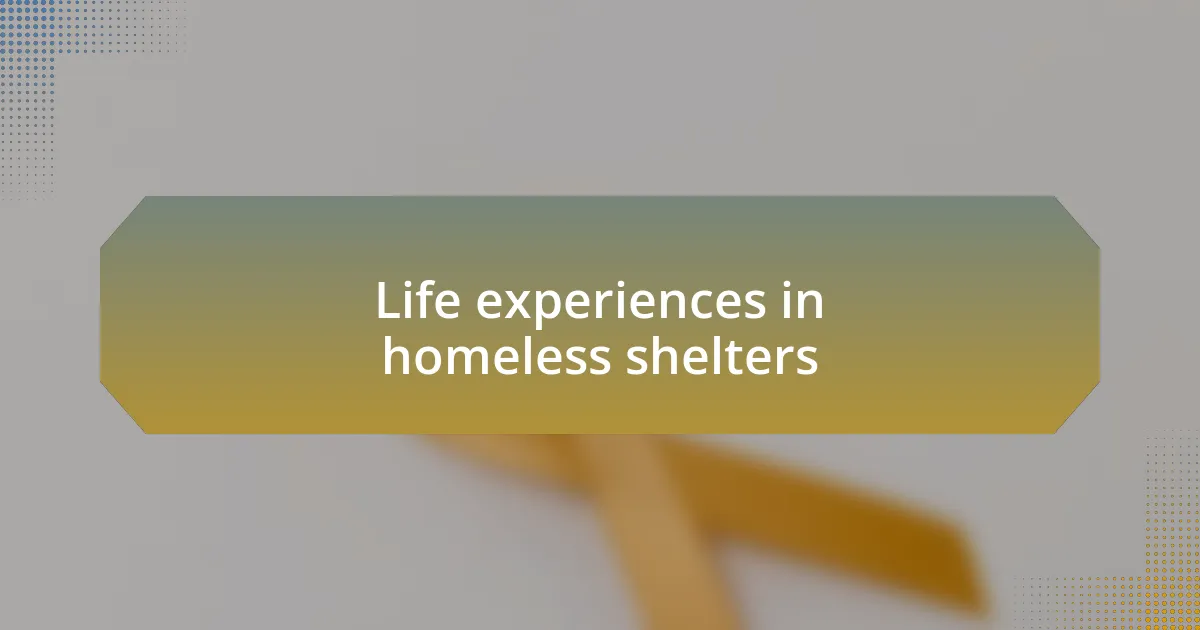
Life experiences in homeless shelters
Life experiences in homeless shelters can be profoundly transformative. I recall a night spent in a shelter where, despite the harsh circumstances, I felt an unexpected sense of camaraderie among the occupants. We shared stories, laughter, and even tears, which created bonds that went beyond our immediate struggles. This shared experience illustrated that, even in our lowest moments, a sense of community can emerge.
The daily routines in shelters can both challenge and nurture resilience. On one occasion, I participated in a group discussion led by a social worker, aimed at helping us express our feelings and aspirations. It was eye-opening to see how many people, despite facing significant hardships, held dreams for their future. This atmosphere of hope fostered an incredible energy; it made me reflect on how often I take my own dreams for granted.
Navigating the challenges of life in a shelter can be overwhelming, yet it often unveils profound lessons about perseverance. I remember witnessing a fellow resident wake up every morning with determination, attending job interviews despite setbacks. It made me question: what drives a person to keep trying in the face of failure? His tenacity was a powerful reminder that resilience can be cultivated, even amid adversity.
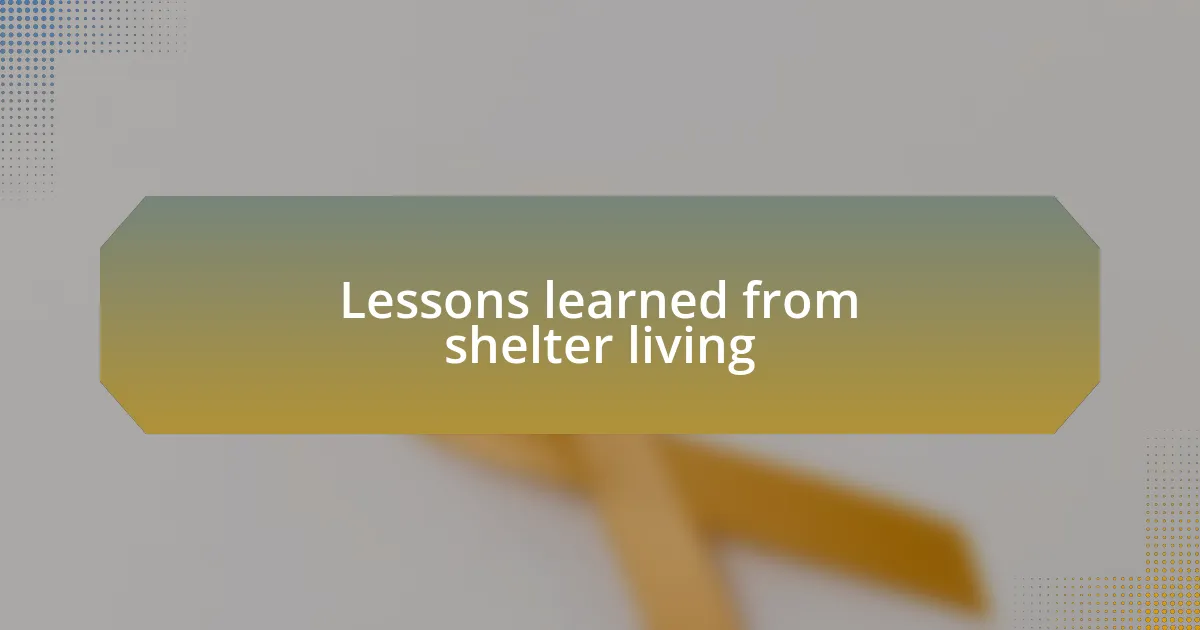
Lessons learned from shelter living
Living in shelters taught me the value of gratitude in the face of adversity. I remember one evening during a particularly cold winter, I huddled under a worn blanket as the wind howled outside. In that moment, I realized how easy it is to overlook the simple comforts of warmth and safety when life becomes overwhelming. This experience sincerely shifted my perspective on everyday blessings that many take for granted.
Another lesson emerged around compassion. One night, I noticed a newcomer, visibly distressed, sitting alone. Rather than shying away, I approached him, sharing my story and listening to his. This brief connection not only eased his anxiety but deepened my understanding of the impact of kindness. I often find myself reflecting: how far a simple, genuine gesture can go in bridging divides and offering solace.
Living in a shelter also highlighted the power of adaptability. There were days when the environment felt chaotic, with tempers flaring and emotions running high. Yet, I learned that by focusing on what I could control—like my reactions and mindset—I could create a more peaceful experience for myself. It made me question: how often do we feel powerless in challenging situations, forgetting that our perspective is one of the few things we can change?

Personal growth through adversity
It’s fascinating how personal growth often takes root in the harshest conditions. I remember attending a workshop organized by the shelter one evening. It was a space where we shared stories of our journeys. Listening to others’ struggles and triumphs inspired me to recognize my own strength. I often reflect: How can we truly know our resilience until we are tested?
Additionally, I found that living through adversity can foster a profound sense of community. I’ll never forget the shared laughter with fellow residents over a simple meal, despite the circumstances binding us together. Those moments taught me the importance of unity and support during tough times. Have you ever experienced a bond with someone born out of shared hardship? It can be incredibly uplifting.
Adversity also opened my eyes to the necessity of setting goals. Each morning, I made it a point to write down one small thing I wanted to achieve that day, whether it was making a new friend or volunteering to help clean. Seeing those simple tasks take shape fueled my motivation and gave me a sense of purpose. How often do we lose sight of our goals when life becomes chaotic? For me, it became a reminder that navigating through storms can lead to personal clarity and direction.
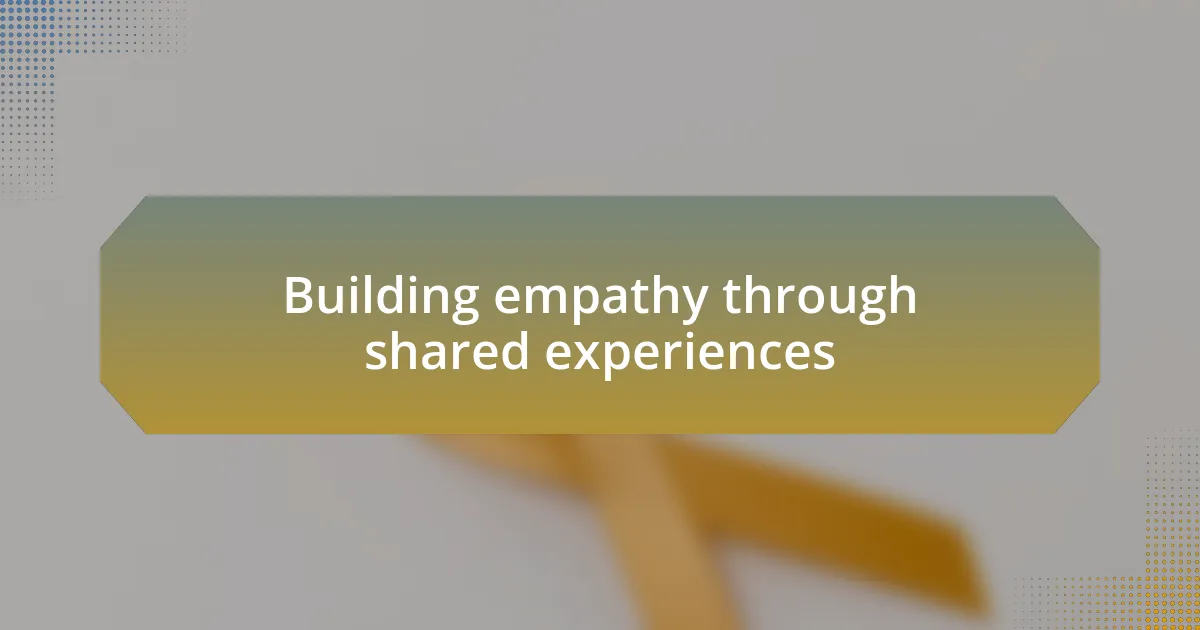
Building empathy through shared experiences
Understanding hardship through shared experiences can profoundly shift our perspective on empathy. I recall a time when we organized a storytelling circle at the shelter. As I listened to someone recount their journey through addiction, I felt a surge of connection. Who would have imagined that a story of struggle could resonate so deeply? It was a vivid reminder that beneath each person’s exterior lies a narrative that shapes their reality.
In moments like these, I realized that empathy isn’t just an abstract concept; it’s born from intimacy and vulnerability. I met a young mother who had fled domestic violence, and her recounting of those terrifying nights took me back to my own childhood fears. How often do we underestimate the power of a sincere conversation to bridge divides? The weight of her story lingered with me, prompting not just sympathy but a real desire to understand her emotions and experiences.
The laughter we shared after the stories often felt like a healing balm. One evening, someone made a light-hearted joke about our living conditions, and it sparked a ripple of laughter among us. I found myself thinking: Isn’t it interesting how humor can soften even the heaviest of burdens? Moments like these reinforce the idea that while our circumstances may be different, the emotions we share—a mix of sorrow, joy, and hope—draw us closer together, fostering a sense of community that transcends individual struggles.
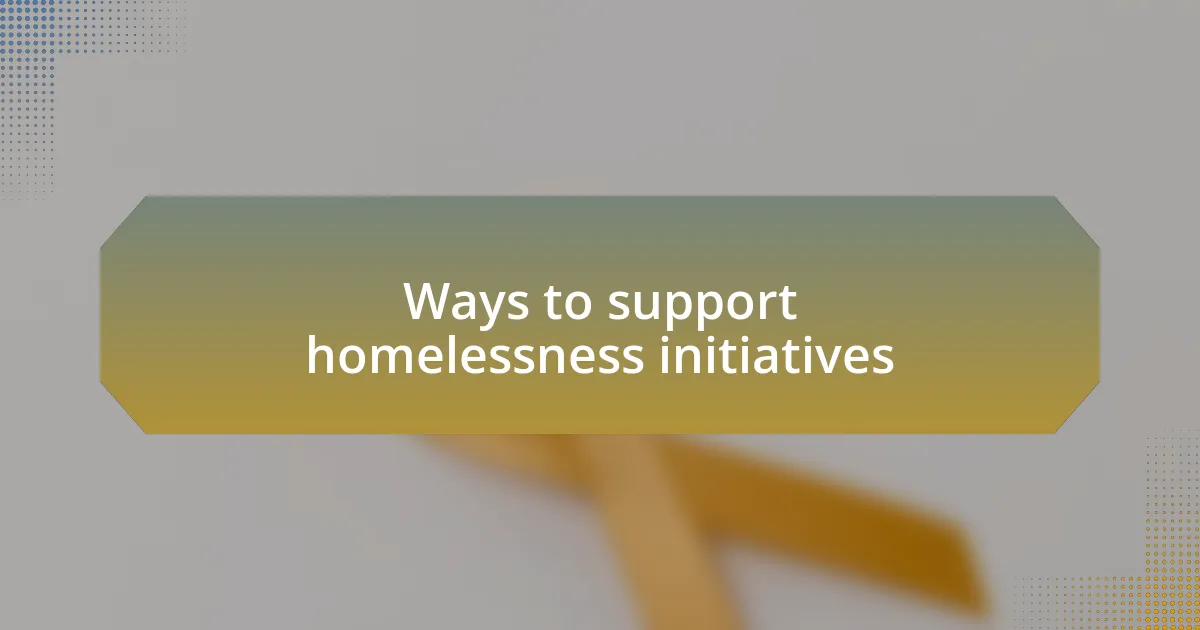
Ways to support homelessness initiatives
Supporting homelessness initiatives can take many forms, and I’ve experienced a few first-hand. Volunteering at local shelters not only fills immediate needs but also provides warmth and companionship to those in need. I remember helping serve dinner one evening and noticing the grateful smiles shining back at me. It made me ask: How powerful is a simple meal shared among friends? It’s moments like these that remind us that our time is as valuable as our donations.
Donating items such as clothing, hygiene products, or even books can profoundly impact those experiencing homelessness. I once collected blankets and warm clothing from friends and felt an overwhelming sense of gratitude from the individuals I met when handing them out. Seeing someone wrap themselves in a cozy blanket was a gentle reminder that the little things we often take for granted can be lifelines for others. Have you ever thought about what a pair of warm socks can mean to someone on a cold night?
Creating awareness in your community is another crucial way to support initiatives aimed at combating homelessness. When I shared my experiences from the shelter at a local event, people began to view the issue in a new light. It made me realize how critical our voices are in sparking change. Every conversation can lead to deeper understanding—why not start one today? Exploring these channels can not only help those experiencing homelessness but also enrich our own lives in unforeseen ways.